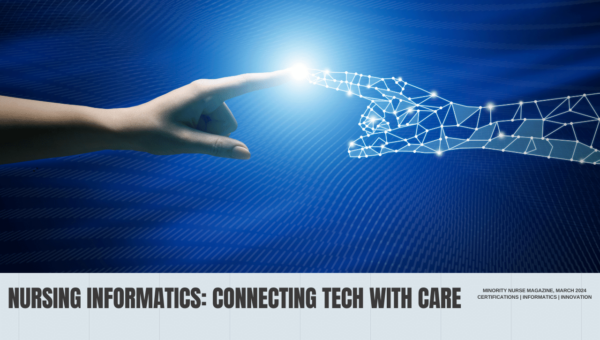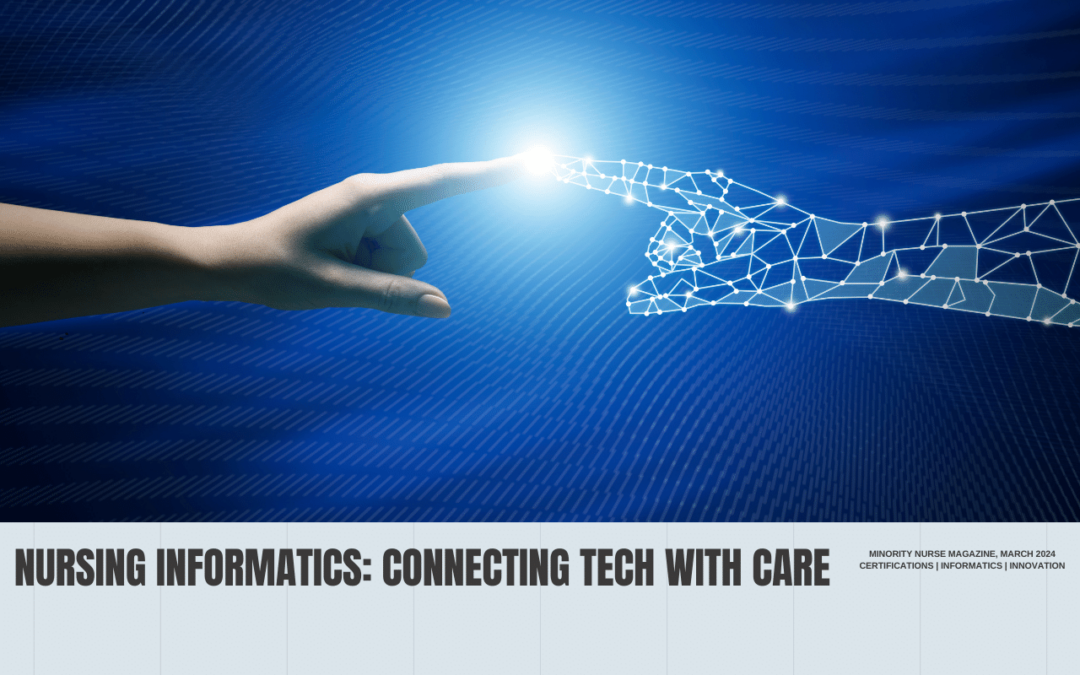Are you the tech-savvy nurse on the unit? Do your colleagues seek you out with questions about the quirks of your electronic health record (EHR)? If so, consider turning that know-how into a career in nursing informatics.
Leveraging Bedside Experience
Nursing informatics reads a definition from the ANA’s Nursing Informatics: Scope and Standards of Practice, 3rd Edition, “is the specialty that transforms data into needed information and leverages technologies to improve health and healthcare equity, safety, quality, and outcomes.”
A background at the bedside is critical for a successful nursing informatics role. “There’s typically some kind of clinical experience involved before jumping into an informatics role,” said Christy St. John, MSN, RN, NI-BC, CPHQ, president of the American Nursing Informatics Association (ANIA), in an interview. “To come straight from your studies into informatics is fairly rare.”
A combination of clinical nursing experience and education in informatics is essential, according to Melinda L. Jenkins, PhD, FNP, associate professor and director, nursing informatics specialty, Rutgers School of Nursing. Experience with patient care in the clinical setting is essential to the nursing informatics role because this role is the connection between the clinical setting and the technology piece of healthcare, says Lori Martone-Roberts, DNP, RN, CHSE, director of simulation and professor of the practice of nursing, Wheaton College.
Although training and hands-on experience with technology is important, Michael Mickan, chief nursing informatics officer at Memorial Hermann Health System, looks for experience using the tools on hand and a natural curiosity that leads to self-teaching. He feels that a nurse with that kind of informal experience is usually more successful as a nurse informaticist than those who wait to be formally trained before exploring a new technology.
Range of Skills
You’ll need to bring many skills to a nursing informatics role. Mickan outlines a variety of abilities:
Communications: Nurse informaticists must be able to provide “translation” of patient care, and clinician needs to technology partners as well as technology concepts and requirements to clinical users and communicate with various disciplines.
Problem-solving: Informaticists must be able to identify the real problem with astute observation and critical thinking encompassing people, processes, and technology.
Change management: Nurse informaticists must understand change management strategies and be comfortable facilitating, guiding, and managing change.
Project management: Often, a nurse informaticist facilitates collaboration between clinical and technology partners to solve problems and support the optimal use of technology. To do this effectively, proficiency in project management is a must.
Data analytics: Nurse informaticists must have a solid grasp of the data that validates the problems to be solved and provides the baseline for measuring progress.
Day-to-Day Projects
What kind of work will you do on a daily basis? An example, notes Martone-Roberts, could be to evaluate workflows or improve usability and streamline processes, leading to improved functioning and efficient data capture.
She notes that nurses in the nursing informatics role will work with EHRs in various ways, including managing information and troubleshooting issues when healthcare professionals use the system. Other projects involve training, validating, and reporting data and ensuring the collected data is useful.
She suggests that one example of a project could involve using chatbots to keep a patient engaged and decrease re-hospitalization. Similarly, Mickan outlines workflow analysis and optimization projects, working with clinical decision support systems and EHR implementation and optimization.
Growing Field
When it comes to future demand for nursing informaticists, “I see it as a growing sector,” says St. John.
“I think sometimes it’s a matter of being a little bit more broad in the way we think about nursing informatics,” she notes. Instead of simply searching for the term on a job site, a job search can be more about “opening my eyes to things that might include AI, analyst, or health informatics roles. I think nurse informatics roles will be more in demand in the bigger picture of health technology.”
Education and Certification
According to Martone-Roberts, you’ll need an RN and BSN to serve in a nursing informatics role. Also, she says, a nurse with a master’s degree in healthcare informatics, nursing informatics, or data management will be better positioned to succeed.
As in most nursing roles, certification can enhance your standing. The ANCC’s Informatics Nursing Certification (NI-BC) is one of the foremost certifications specifically focused on the characteristics of the nurse informaticist’s role, says Mickan. While not specifically focused on nursing, he says the HIMSS Certified Professional in Healthcare Information and Management Systems (CPHIMS) certification demonstrates knowledge of informatics.
Serving the Patient
Although one of the more technical roles in nursing, nursing informatics still has patient care as the end goal. “At the end of the day, what we’re after is better outcomes for the populations that we’re serving, whether that’s in the inpatient setting, whether that’s in an ambulatory setting, whether that’s in our communities,” says St. John.
Sign up now to get your free digital subscription to Minority Nurse.
- Nursing Informatics: Connecting Tech with Care - March 22, 2024
- Practical Strategies for Implementing Evidence-Based Practice - February 22, 2024
- What to Look for in a Nurse Residency Program - January 24, 2024



